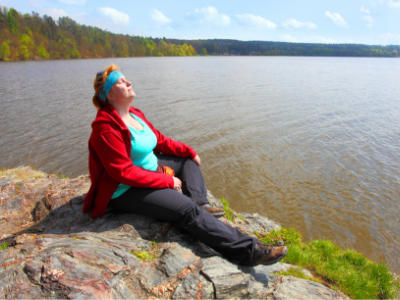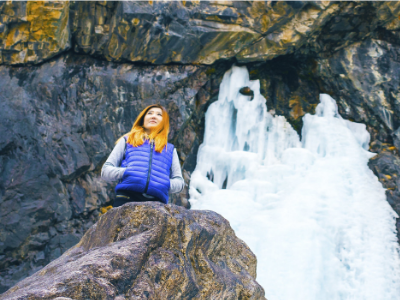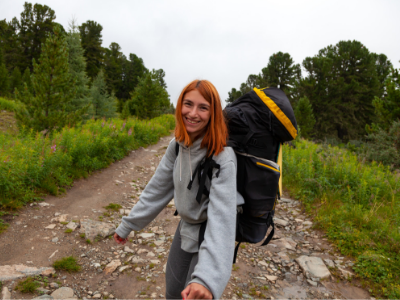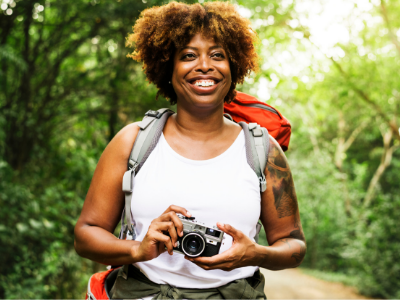I love hiking and yet I haven’t always. I grew up watching TV and eating microwave meals. I was raised by a single mom who worked long hours just to make sure I could have warm clothes to wear and our heat would turn on in the winter months.
Little did I know, we lived in one of the greatest places in the world to explore on foot, the Pacific Northwest. I did not know this until four years ago.
I decided I wanted to learn more about hiking and adventuring. I looked around a little bit for some insight as to how someone like me — with zero outdoor experience, new to exercise, and kind of a nerd — would go about getting started.
 I found tons of useful information, tons of not-so-useful information, and learned many lessons along the way. The more time I spent outside the more I wanted to create a hiking group in my community focused on inclusivity and body respect.
I found tons of useful information, tons of not-so-useful information, and learned many lessons along the way. The more time I spent outside the more I wanted to create a hiking group in my community focused on inclusivity and body respect.
My area has no shortage of hiking groups for folks who are already comfortable being in the outdoors, fellow mountaineers, even beginners who are already athletic in other arenas.
What I wanted to start was a group for folks like me and my friends: people with little to no exercise experience, who need some support to get started and build confidence being outside. And so I did!
1. Be Safe & Be Prepared
The most important to be aware of when starting out is making sure that you are safe. With this in mind, the main things to consider are:
- Having enough food and water.
- Knowing where you’re going.
In regards to water, always bring more than you’ll need if there isn’t a water source on the trail. Dehydration is no joke and something that can be easily avoided by planning ahead.
Before heading out, read as much as you can online about the trail. Download maps, directions and any apps you might need to navigate your trip before leaving the house. Bring your smartphone fully charged too because even if you’re out of cell range, your GPS will still work! And you can take some stunning photos!
2. Dress Smart (It Doesn’t Mean Fancy)
When I started, every time I looked at pictures of people hiking, they always had super fancy gear. Being new to the whole idea of the outdoors, I thought that must be required, that there must be something really special about this stuff, and I couldn’t go out unless I had stuff that costs a lot of money.
 This is not true! Over the years I’ve slowly accumulated gear that works for me, some costly, but I certainly didn’t start with anything high end.
This is not true! Over the years I’ve slowly accumulated gear that works for me, some costly, but I certainly didn’t start with anything high end.
Remember that safety is number one, followed by comfort. Depending on your climate, you may only need a few key items to be safe.
You can spend a lot of money on layers or you can just make sure you are not wearing cotton. It’s really that simple. I typically wear a synthetic base layer (think long sleeve athletic shirt), something a little thicker for a middle layer and then a coat or outer layer that will keep me dry. Boom.
3. Know That You Belong
Although it’s changing, the dominant image of outdoor culture is white, thin, cisgender, able-bodied hikers.
Just because you don’t see yourself represented in outdoor culture, doesn’t mean you don’t belong.
Many folks are part of a movement to change the way diversity is represented in outdoor culture. It still might be a while before you see someone like you represented in books and digital advertising. Don’t let that stop you!
Know that you belong wherever you are. You belong in your body, you belong on the trail and you deserve to be here.
4. Find the Right Folks
 In my experience leading group hikes over the past four years, I’ve heard numerous stories of folks express their trepidation hiking with others because of a fear of being left behind or feeling intimidated by expertise or fitness level.
In my experience leading group hikes over the past four years, I’ve heard numerous stories of folks express their trepidation hiking with others because of a fear of being left behind or feeling intimidated by expertise or fitness level.
Hike with people who are supportive and patient, who are interested in sticking with you, or agree to convene regularly on the trail.
That said, if you enjoy time alone, don’t shy away from hiking solo. Spending your precious trail time trying to keep up with people and missing out on the beauty of the journey is a major bummer. I often hike alone with my pup for this very reason. I love the solitude and I love being able to go at my own pace and stop and enjoy the scenery anytime I want.
5. Be in Service to the Land
If you’ve spent any time at all familiarizing yourself with outdoor recreation you’ve probably heard one of the more recited guidelines for outdoor adventuring: Leave no trace.
Leave no trace is summarized in seven principles:
- Plan ahead and prepare.
- Stay on the trails and camp on durable surfaces.
- Pack out your trash and pick up any other trash you find.
- Leave everything as you find it.
- Be careful with fire.
- Respect wildlife.
- Be considerate of other visitors.
These seven principles are instructions for how to respect the land. I like thinking about “being in service” rather than respect because it helps me relate to the environment like the living breathing being that it is.
 I often think the land is disrespected when we forget that the outdoors isn’t an object for us to consume. It’s truly alive and constantly evolving and changing just like us. It responds to the conditions it’s under.
I often think the land is disrespected when we forget that the outdoors isn’t an object for us to consume. It’s truly alive and constantly evolving and changing just like us. It responds to the conditions it’s under.
If it’s abused with littering and meadow stomping, it will deteriorate. If it’s respected and left the way we find it, it will have more opportunity to flourish.
Another way I’m learning it’s important to respect the land is by bringing consciousness to the indigenous peoples who live and have lived here since time immemorial. Prior to white settlement, the land we currently live on and consider our national forests or parks was a thriving and sustainable ecosystem in which indigenous people lived in reciprocity with the land.
There’s so much more to say about this but for now, I’d love to encourage you to learn about the history of the land you’re on. Read and listen to the stories of indigenous peoples. Spend a few minutes on your hike imagining what the land may have been like 200 years ago and what impact settlement has had on this precious impermanent planet.
6. Don’t Rush & Enjoy the Journey
Even though I often seek out time in nature to calm my anxiety, I still forget to slow down and take it all in. This is one of my greatest lessons of all: there’s no rush to the top.
I sometimes meet my self-criticism gremlins when hiking, especially when I’m on a popular trail on a weekend and I’m being passed constantly by other hikers. It’s not uncommon for me to encounter hikers jogging up a mountain when I am panting like a sweaty pug on spring break.
Even when my self-talk isn’t kind, the trail is always kind to me. I try to use each step as an opportunity to make friends with whatever criticism I might be enduring.
 At the end of a switchback, pause and take as many loud breaths as you need. Look how far you’ve come. You can literally look down from your climb and see your progress in a very tangible way.
At the end of a switchback, pause and take as many loud breaths as you need. Look how far you’ve come. You can literally look down from your climb and see your progress in a very tangible way.
In our day to day, our little anxieties and troubles can feel so all-encompassing. Nature is always there to remind us how small we truly are. No matter how important you think you are, you can look anywhere and see yourself dwarfed by trees or rocks. Relish in the magic of it all.
Resources
The following smartphone apps can enhance your hiking experience:
- Alltrails
- Avena Maps
- Native Land
- Google Maps
FREE Course – 5 SECRETS TO GET MORE RESULTS IN LESS TIME
Learn the most effective strategies for getting the exact results you want — without spending your life in the gym.
Our Girls Gone Strong Formula has helped thousands of women from all around the world get the results they’re looking for.
Click the button below to get your first free lesson.

